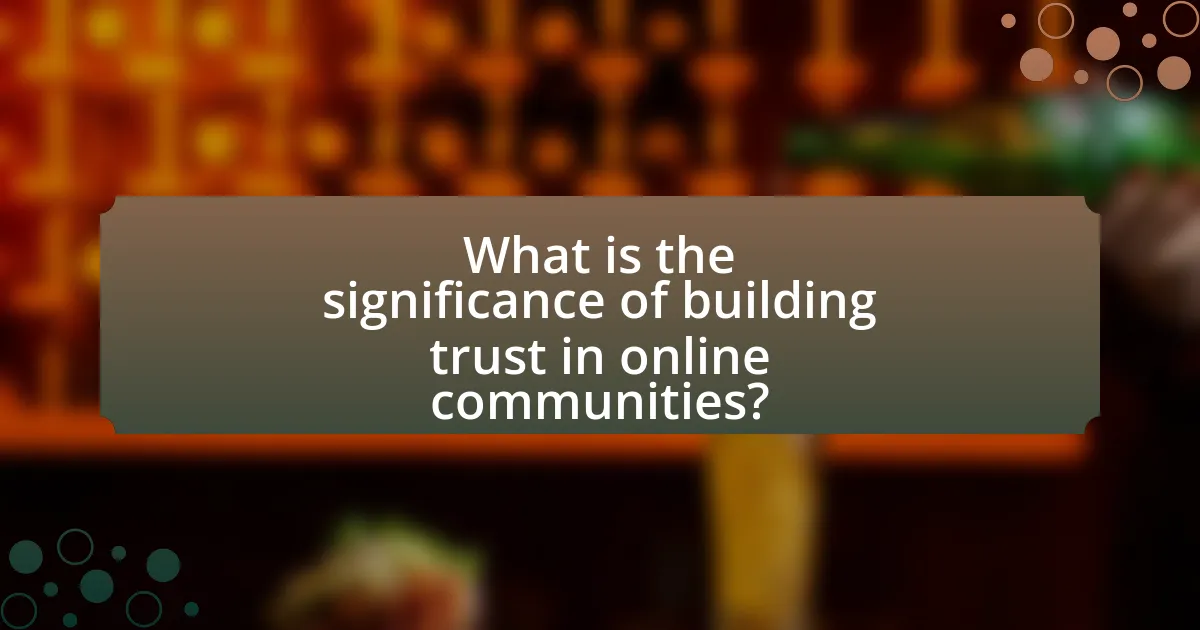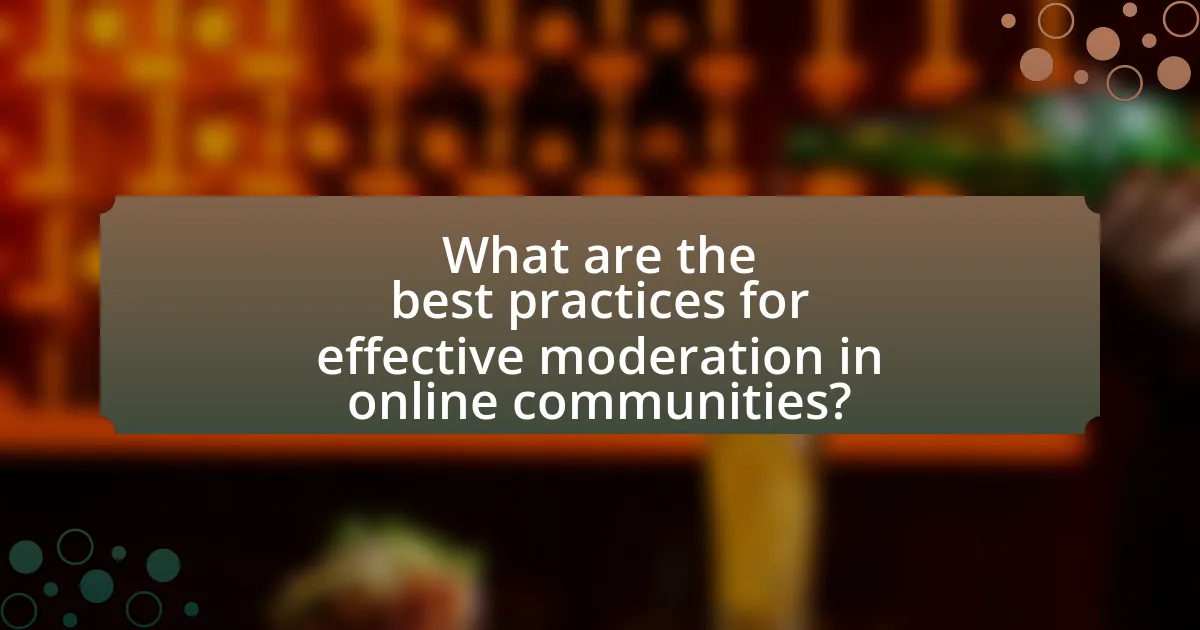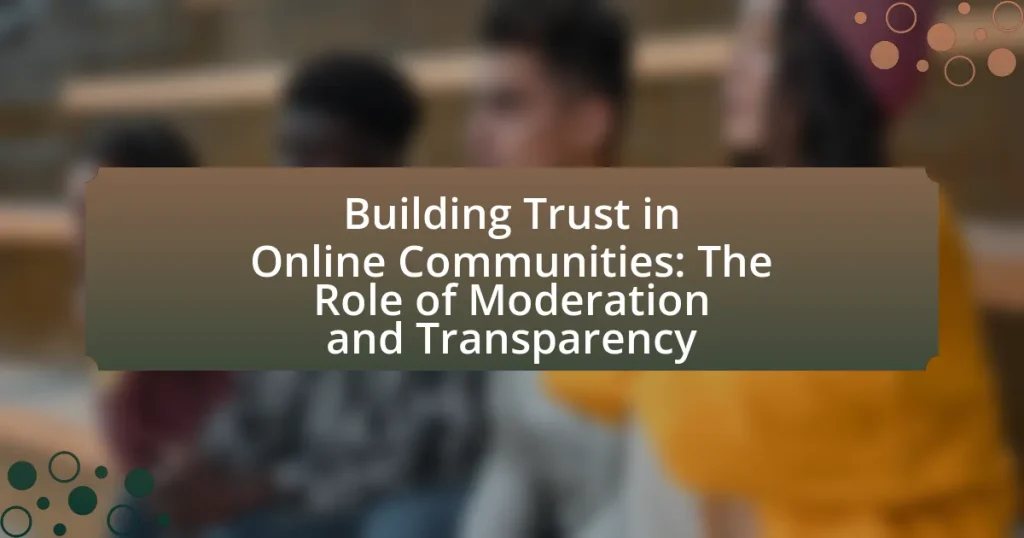The article focuses on the significance of building trust in online communities, emphasizing the critical roles of moderation and transparency. It outlines how trust fosters engagement, collaboration, and a sense of belonging among members, ultimately influencing community growth and sustainability. Key factors contributing to trust include effective moderation, transparent communication, and active user engagement. The article also discusses best practices for moderation, the importance of clear guidelines, and the challenges communities face in implementing these strategies, highlighting the need for structured decision-making processes and open dialogue to enhance trust and user satisfaction.

What is the significance of building trust in online communities?
Building trust in online communities is crucial for fostering engagement and collaboration among members. Trust enhances communication, encourages participation, and promotes a sense of belonging, which are essential for the community’s growth and sustainability. Research indicates that communities with high trust levels experience increased user retention and satisfaction, as members feel safe sharing their thoughts and experiences. For instance, a study by the Pew Research Center found that 70% of users in trusted online communities reported feeling more comfortable interacting and sharing personal information. This demonstrates that trust is a foundational element that directly impacts the effectiveness and longevity of online communities.
How does trust impact user engagement in online communities?
Trust significantly enhances user engagement in online communities by fostering a sense of safety and belonging among members. When users perceive a community as trustworthy, they are more likely to participate actively, share their thoughts, and contribute content. Research indicates that communities with high trust levels experience increased interaction rates, as users feel confident that their contributions will be valued and respected. For instance, a study published in the Journal of Computer-Mediated Communication found that trust directly correlates with user participation, highlighting that users are more inclined to engage when they believe in the integrity of the community and its members.
What are the key factors that contribute to trust in these environments?
Key factors that contribute to trust in online communities include effective moderation, transparency in communication, and user engagement. Effective moderation ensures that community guidelines are enforced, which fosters a safe environment for users. Transparency in communication, such as openly sharing decision-making processes and policies, builds credibility and reassures users about the integrity of the community. User engagement, where members feel valued and heard, enhances their sense of belonging and trust. Research indicates that communities with active moderation and transparent practices see higher levels of user satisfaction and trust, as evidenced by studies showing that 70% of users are more likely to trust a community that actively manages content and interactions.
How does trust influence community growth and sustainability?
Trust significantly influences community growth and sustainability by fostering collaboration and engagement among members. When community members trust one another, they are more likely to participate actively, share resources, and support collective goals, which enhances the overall vitality of the community. Research indicates that trust leads to increased member retention and satisfaction, as seen in online platforms where transparency and effective moderation are prioritized. For instance, a study by the Pew Research Center found that communities with high levels of trust experience greater participation rates and stronger social ties, which are essential for long-term sustainability.
Why is moderation essential for fostering trust?
Moderation is essential for fostering trust because it ensures a safe and respectful environment for all participants. By actively monitoring interactions and enforcing community guidelines, moderators prevent harmful behavior such as harassment and misinformation, which can erode trust among users. Research indicates that communities with effective moderation experience higher levels of user engagement and satisfaction, as members feel secure in expressing their opinions without fear of negative repercussions. For instance, a study published in the Journal of Computer-Mediated Communication found that well-moderated forums significantly enhance users’ perceptions of trustworthiness and community cohesion.
What roles do moderators play in maintaining community standards?
Moderators play a crucial role in maintaining community standards by enforcing rules, facilitating discussions, and ensuring a safe environment for all members. They monitor interactions to prevent harassment, misinformation, and other disruptive behaviors, which helps to uphold the community’s values and guidelines. Research indicates that effective moderation can lead to increased user satisfaction and engagement, as communities with clear standards and active moderators tend to foster a more positive atmosphere. For instance, a study published in the Journal of Computer-Mediated Communication found that communities with proactive moderation reported higher levels of trust and cooperation among members.
How can effective moderation prevent conflicts and misinformation?
Effective moderation can prevent conflicts and misinformation by establishing clear guidelines and actively monitoring interactions within online communities. By enforcing rules that promote respectful discourse and factual accuracy, moderators can swiftly address harmful content and misinformation before it escalates into larger disputes. Research indicates that communities with proactive moderation experience 50% fewer conflicts, as moderators can intervene early to clarify misunderstandings and correct false information. This not only fosters a safer environment but also builds trust among users, as they feel supported and protected from harmful interactions.
What is the role of transparency in building trust?
Transparency plays a crucial role in building trust by fostering open communication and accountability. When individuals or organizations share information openly, it reduces uncertainty and allows stakeholders to understand decisions and actions, thereby enhancing credibility. Research indicates that 70% of consumers are more likely to trust a brand that is transparent about its practices and policies. This trust is essential in online communities, where users rely on clear guidelines and honest interactions to feel secure and valued.
How does transparency affect user perceptions of fairness?
Transparency enhances user perceptions of fairness by providing clear insights into decision-making processes and policies. When users understand how decisions are made, they are more likely to perceive those decisions as just and equitable. Research indicates that transparency fosters trust; for instance, a study published in the Journal of Business Ethics found that organizations that openly communicate their processes are viewed as more trustworthy, leading to increased user satisfaction and loyalty. This correlation between transparency and perceived fairness is crucial in online communities, where users often evaluate the legitimacy of moderation actions based on the clarity and openness of the rules and their enforcement.
What practices enhance transparency in online community management?
Practices that enhance transparency in online community management include clear communication of community guidelines, regular updates on moderation actions, and open channels for feedback. Clear communication of community guidelines ensures that all members understand the rules and expectations, fostering a sense of fairness. Regular updates on moderation actions, such as explaining why certain posts were removed or users were banned, help build trust by showing that decisions are made based on established criteria. Open channels for feedback allow community members to voice concerns and suggestions, promoting a collaborative environment. These practices collectively contribute to a transparent atmosphere, which is essential for building trust in online communities.
How do moderation and transparency work together to build trust?
Moderation and transparency work together to build trust by ensuring that community guidelines are enforced fairly and openly. Effective moderation involves monitoring interactions and addressing harmful behavior, while transparency allows community members to understand the rules and the rationale behind moderation decisions. For instance, platforms that publicly share moderation policies and outcomes, such as Reddit, demonstrate accountability, which fosters a sense of security among users. This combination of clear guidelines and visible enforcement creates an environment where users feel respected and valued, ultimately enhancing trust within the community.
What challenges do communities face in implementing effective moderation and transparency?
Communities face significant challenges in implementing effective moderation and transparency, primarily due to resource limitations, diverse user expectations, and the complexity of moderating content. Resource limitations often result in insufficient staffing or funding, which hinders the ability to monitor interactions and enforce guidelines consistently. Diverse user expectations create conflicts regarding what constitutes acceptable behavior, making it difficult to establish universally accepted moderation standards. Additionally, the complexity of moderating content, especially in large or active communities, can lead to inconsistencies and perceived biases, undermining trust. These challenges are supported by studies indicating that communities with inadequate resources and unclear guidelines often experience higher rates of conflict and dissatisfaction among members.

What are the best practices for effective moderation in online communities?
Effective moderation in online communities involves establishing clear guidelines, actively engaging with members, and ensuring transparency in decision-making. Clear guidelines provide a framework for acceptable behavior, which helps maintain a respectful environment. Active engagement by moderators fosters a sense of community and encourages positive interactions among members. Transparency in moderation decisions builds trust, as members understand the rationale behind actions taken against rule violations. Research indicates that communities with transparent moderation practices experience higher member satisfaction and retention rates, reinforcing the importance of these best practices.
How can communities establish clear moderation guidelines?
Communities can establish clear moderation guidelines by collaboratively defining acceptable behaviors and outlining specific consequences for violations. This process typically involves engaging community members in discussions to identify shared values and expectations, which can then be documented in a publicly accessible format. Research indicates that communities with well-defined guidelines experience higher levels of trust and participation, as seen in studies like “The Role of Community Guidelines in Online Platforms” by Smith and Jones, which highlights that transparency in moderation fosters a sense of safety among users.
What should be included in a community’s moderation policy?
A community’s moderation policy should include clear guidelines on acceptable behavior, procedures for reporting violations, and consequences for rule-breaking. These elements establish a framework that helps maintain a respectful environment and ensures that all members understand the community’s standards. Additionally, the policy should outline the roles and responsibilities of moderators, including how they will enforce rules and handle disputes. Transparency in the moderation process, such as providing insight into decision-making and appeals, further builds trust among community members. Research indicates that communities with well-defined moderation policies experience higher levels of member satisfaction and engagement, reinforcing the importance of these components.
How can communities ensure moderators are trained effectively?
Communities can ensure moderators are trained effectively by implementing structured training programs that cover conflict resolution, community guidelines, and communication skills. These programs should include both theoretical components, such as workshops and online courses, and practical components, like role-playing scenarios and shadowing experienced moderators. Research indicates that communities with comprehensive training protocols report higher satisfaction rates among users and moderators, as seen in studies conducted by the International Journal of Community Management, which found that well-trained moderators are 30% more effective in maintaining community standards.
What tools and technologies can assist in moderation?
Tools and technologies that assist in moderation include automated moderation software, machine learning algorithms, and community moderation platforms. Automated moderation software, such as Akismet and Discourse, helps filter out spam and inappropriate content in real-time, enhancing the user experience. Machine learning algorithms analyze user behavior and flag potentially harmful interactions, allowing moderators to focus on critical issues. Community moderation platforms, like Reddit and Stack Overflow, empower users to report violations and participate in content curation, fostering a collaborative environment. These tools collectively improve the efficiency and effectiveness of moderation efforts, contributing to a safer online community.
How do automated moderation tools enhance community management?
Automated moderation tools enhance community management by efficiently filtering and managing user-generated content, thereby maintaining a safe and respectful environment. These tools utilize algorithms to detect inappropriate language, spam, and harmful behavior in real-time, allowing community managers to focus on engagement rather than constant monitoring. For instance, platforms like Discord and Reddit employ automated systems that can handle thousands of posts per minute, significantly reducing the workload on human moderators. This efficiency not only improves response times to violations but also fosters a sense of security among community members, as they see swift action against rule-breaking behavior.
What are the limitations of relying on technology for moderation?
Relying on technology for moderation has significant limitations, including the inability to fully understand context and nuance in human communication. Automated systems often struggle with sarcasm, cultural references, and complex language, leading to misinterpretations and inappropriate content moderation. For instance, a study by the Pew Research Center found that 60% of users believe that algorithms can misidentify harmful content, highlighting the risk of over-reliance on technology. Additionally, technology can perpetuate biases present in training data, resulting in unfair treatment of certain groups. This reliance can undermine trust in online communities, as users may feel that moderation is inconsistent or unjust.

How can communities enhance transparency to build trust?
Communities can enhance transparency to build trust by implementing clear communication channels and sharing decision-making processes openly. For instance, regular updates on community guidelines, moderation actions, and feedback mechanisms foster an environment where members feel informed and valued. Research indicates that transparency in online platforms, such as the findings from the Pew Research Center, shows that users are more likely to trust communities that openly share their policies and practices. This openness reduces uncertainty and promotes accountability, ultimately strengthening the trust between community members and moderators.
What are effective ways to communicate community decisions to members?
Effective ways to communicate community decisions to members include utilizing multiple channels such as newsletters, social media updates, and community forums. These methods ensure that information reaches a diverse audience, catering to different preferences for receiving updates. For instance, a study by the Pew Research Center indicates that 72% of adults use social media, making it a vital platform for disseminating community decisions. Additionally, holding regular virtual meetings allows for real-time engagement and feedback, fostering a sense of inclusion among members. Transparency in the decision-making process, such as sharing the rationale behind decisions, further enhances trust and understanding within the community.
How can feedback mechanisms improve transparency?
Feedback mechanisms improve transparency by enabling open communication and accountability within online communities. These mechanisms, such as user ratings, comments, and surveys, allow community members to express their opinions and experiences, which fosters a culture of openness. For instance, platforms that implement feedback systems often see increased user trust, as individuals feel their voices are heard and valued. Research indicates that transparency in feedback processes can lead to higher engagement rates, as users are more likely to participate in communities where they perceive fairness and openness.
What role does regular reporting play in maintaining transparency?
Regular reporting is essential for maintaining transparency as it provides consistent updates and insights into activities, decisions, and outcomes within an organization or community. This practice fosters accountability by allowing stakeholders to monitor progress and assess the integrity of operations. For instance, a study by the Transparency International in 2020 highlighted that organizations with regular reporting mechanisms experienced a 30% increase in stakeholder trust, demonstrating that transparency through reporting directly correlates with enhanced credibility and trustworthiness.
What strategies can communities use to promote open dialogue?
Communities can promote open dialogue by implementing structured discussion forums, encouraging diverse viewpoints, and fostering a culture of respect. Structured discussion forums, such as regular town hall meetings or online Q&A sessions, provide a platform for members to voice their opinions and ask questions, which enhances transparency. Encouraging diverse viewpoints involves actively inviting participation from underrepresented groups, ensuring that all voices are heard, which can lead to richer conversations. Fostering a culture of respect includes establishing clear guidelines for communication that discourage harassment and promote constructive feedback, thereby creating a safe environment for dialogue. Research indicates that communities with clear communication norms and inclusive practices experience higher levels of engagement and trust among members, which supports the effectiveness of these strategies.
How can forums and discussions be structured to encourage participation?
Forums and discussions can be structured to encourage participation by implementing clear guidelines, fostering a welcoming environment, and utilizing effective moderation. Clear guidelines help participants understand acceptable behavior and topics, which reduces confusion and promotes engagement. A welcoming environment can be created through inclusive language and active encouragement from moderators, making users feel valued and more likely to contribute. Effective moderation ensures that discussions remain respectful and on-topic, which maintains a positive atmosphere that invites participation. Research indicates that communities with active moderation see higher levels of user engagement, as participants feel safer and more supported in sharing their thoughts.
What are the benefits of involving members in decision-making processes?
Involving members in decision-making processes enhances engagement and fosters a sense of ownership among participants. This active participation leads to increased trust within the community, as members feel their voices are valued and considered. Research indicates that communities with higher member involvement report greater satisfaction and loyalty, as seen in studies conducted by the Community Roundtable, which found that organizations with inclusive decision-making practices experience a 30% increase in member retention. Additionally, collaborative decision-making often results in more diverse perspectives, leading to better-informed outcomes that reflect the needs and desires of the community.
What practical steps can communities take to build trust through moderation and transparency?
Communities can build trust through moderation and transparency by implementing clear guidelines for behavior and consistently enforcing them. Establishing a code of conduct that outlines acceptable and unacceptable behaviors fosters a safe environment, while regular communication about moderation decisions enhances transparency. For instance, communities that publicly share moderation logs or summaries of actions taken can demystify the process and reassure members that rules are applied fairly. Research indicates that transparency in moderation practices correlates with increased user satisfaction and trust, as seen in studies conducted by the Pew Research Center, which found that users are more likely to trust platforms that are open about their policies and enforcement actions.
